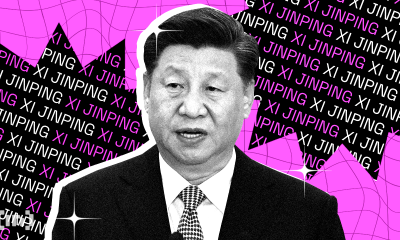Regulation
Ripple CLO Calls On Kamala Harris To End SEC’s War On Crypto

Stuart Alderoty, Ripple’s Chief Legal Officer (CLO), has issued a strong call for action from Vice President Kamala Harris. He urged the VP to end what he describes as the U.S. Securities and Exchange Commission’s (SEC) “misguided war on crypto.” This statement comes in the wake of a significant court ruling in the ongoing legal battle between Ripple and the SEC.
Ripple CLO’s Request To Kamala Harris
Alderoty’s comments were made in the backdrop of a recent interview where he expressed optimism about the court’s decision. However, he took recently took to X and emphasized the need for immediate political intervention. He referred to Vice President Kamala Harris’ proposed “crypto reset.”
Alderoty stated, “If this Admin is serious about a ‘reset,’ it must act NOW to end the SEC’s misguided war on crypto.” Moreover, his remarks underscore the urgency that the crypto community feels in addressing the SEC’s regulatory approach, which many industry leaders view as hostile.
Alderoty On Recent Ripple SEC Lawsuit Ruling
This week, on Wednesday, the court ordered Ripple to pay a $125 million fine for failing to register sales of its XRP token to institutional investors. This amount is significantly less than the $2 billion originally sought by the SEC. Hence, Alderoty hailed the Ripple SEC lawsuit ruling as a victory not only for them but for the entire crypto industry.
He stated, “Ripple didn’t act recklessly… There were no victims; the counterparties to those transactions suffered no financial loss at all.” Furthermore, Alderoty further explained that the court’s decision provided much-needed clarity. It established that XRP itself is not a security, which has been a central issue in the case.
“The core clarity that we sought in this case [is] that XRP is not in and of itself a security… just like a bar of gold is never a security,” he noted. This ruling, according to Alderoty, sets a crucial legal precedent that could influence the crypto regulations. Despite the positive outcome, Alderoty acknowledged the possibility of an appeal from the SEC.
However, he expressed confidence that the Ripple SEC lawsuit is nearing its end. “In our minds, we are finally done… If the SEC is a rational actor… there should be no appeal,” he said. He also emphasized that the blockchain payments firm is focused on moving forward and growing its business.
Also Read: Just-In: Ripple Stablecoin RLUSD Private Beta Live On XRP Ledger & Ethereum Mainnet
Harris Campaign & Crypto Industry
The legal developments in the crypto space has placed Vice President Kamala Harris’ campaign in a challenging position. Recently, Harris’s campaign representatives participated in a crypto roundtable organized by Democratic Congressman Ro Khanna. It also included high-level officials such as Deputy Treasury Secretary Wally Adeyemo and Deputy White House Chief of Staff Bruce Reed.
Although Kamala Harris’ senior adviser, Kristine Lucius, was present, she did not speak during the meeting, according to people present in the meet. The roundtable was part of Harris’s broader effort to engage with the crypto community. Sincerely several years, the community has been calling for clearer regulations and a reset of the government’s approach to the industry.
Also, the Crypto4Harris town hall event is currently underway. This further highlighting the campaign’s efforts to connect with crypto advocates. However, industry leaders like Ripple CEO Brad Garlinghouse and CLO Stuart Alderoty are urging Harris to take immediate and decisive action.
They, along with other prominent figures in the crypto world, also called for the removal of SEC Chair Gary Gensler, who they view as a major obstacle to the industry’s growth. These leaders include Gemini co-founder Tyler Winklevoss and former Coinbase executive Balaji Srinivasan. Meanwhile, Cardano founder Charles Hoskinson continued criticizing Kamala Harris.
Positive Outlook
Despite the ongoing friction between the crypto industry and the SEC, some remain hopeful about the future. Anthony Scaramucci, a well-known figure in the financial industry, expressed optimism that Kamala Harris could soon gain support within the crypto community.
“It’s encouraging that these high-level officials took the time to show up and listen to our industry. My colleagues in the crypto space understandably want action now, but that’s not how things work in Washington,” Scaramucci said, according to a FOX Business report.
In addition, Paul Grewal, Coinbase’s Chief Legal Officer, also voiced a positive outlook. He emphasized the importance of focusing on the Harris campaign’s potential to reshape the government’s approach to crypto. “She’s the perfect candidate to be a strong new face for crypto and make a break with the past,” Grewal stated.
Also Read: XRP Scam: Ripple Issues Warning On Rising XRP Scam After SEC Lawsuit Ruling
Disclaimer: The presented content may include the personal opinion of the author and is subject to market condition. Do your market research before investing in cryptocurrencies. The author or the publication does not hold any responsibility for your personal financial loss.
Regulation
US Senators Reintroduce PROOF Act To Set Reserve Standards for Crypto Firms

As crypto regulation gains ground in the US under pro-crypto President Donald Trump, US Senators are taking further steps to strengthen oversight of digital asset firms. Senators Thom Tillis and John Hickenlooper reintroduced the Proving Reserves of Other Funds (PROOF) Act, which aims to create new standards for transparency and fund management in the cryptocurrency sector.
US Senators Reintroduce PROOF Act Bill
According to Eleanor Terrett, US Senators Tillis and Hickenlooper have renewed their push for the PROOF Act, which was first introduced in 2023. The bill responds to concerns raised by the collapse of FTX, where customer funds were reportedly mixed with the company’s own capital and redirected to affiliated firms.
The PROOF Act would prohibit the co-mingling of customer assets by digital asset custodians and exchanges. It sets requirements for monthly third-party reserve checks, which would ensure that firms hold enough reserves to back customer holdings.
Independent auditing firms would perform these checks, sending the results to the U.S. Department of the Treasury.
Mandatory Proof of Reserves Checks
Under the US Senator’s proposed law, all firms offering digital asset custody or exchange services must undergo monthly Proof of Reserves (PoR) inspections. These checks would verify that firms hold the assets they claim to possess on behalf of their clients.
PoR uses cryptographic tools like Merkle trees and zero-knowledge proofs to verify balances without revealing user data. To ensure transparency, the inspection reports would be made public through the Treasury Department. If a company fails to comply, it will face civil fines that increase with repeated violations.
Although some firms have previously voluntarily shared proof of reserves information, these practices have been inconsistent and often lacked third-party verification. The PROOF Act would create a standardized process across the industry.
Preventing Fund Mismanagement in the Crypto Industry Through The PROOF Act
The US Senators’ renewed effort to pass the PROOF Act follows the financial failure of several crypto companies, most notably FTX. Reports showed that FTX moved customer deposits to its sister firm, Alameda Research, without proper disclosure or reserves, contributing to a major loss of trust in the sector.
Lawmakers aim to reduce the risk of mismanaged or missing funds by introducing strict reserve reporting requirements. The bill, as a result, intends to give customers more confidence that their digital assets are safe and properly accounted for by crypto firms.
The legislation also encourages more responsible behaviour from digital asset institutions by requiring them to follow clearly defined standards. These standards subsequently support regulatory oversight and prevent future financial harm to customers.
SEC Leadership and Regulatory Developments
The reintroduction of the PROOF Act follows Paul Atkins’s appointment as the new Chair of the Securities and Exchange Commission (SEC) in the United States. The Senate endorsed Atkins with a 52 to 44 majority in acknowledging his position on precise crypto regulations.
As a result, the Division of Corporation Finance of the SEC published guidance for crypto issuers as a follow-up to Atkins’ confirmation. The guidance also involves disclosure concerning business models and financial statements and risks associated with digital assets that fall under the definition of securities.
Subsequently, Senator Cynthia Lummis, a pro-Bitcoin legislator, has corroborated the development while acknowledging optimism about the future under Atkins. She stated that from her conversation with Atkins, she became confident in his handling of digital asset regulation.
Disclaimer: The presented content may include the personal opinion of the author and is subject to market condition. Do your market research before investing in cryptocurrencies. The author or the publication does not hold any responsibility for your personal financial loss.
Regulation
US President Donald Trump Signs First Crypto-Related Bill Into Law; Report

US President Donald Trump has signed a joint resolution that will repeal an IRS rule affecting decentralized finance (DeFi) platforms.
This legislation, which has passed through both the Senate and the House, aims to prevent the IRS from enforcing tax reporting requirements on DeFi protocols. The move is seen as a key development in crypto regulation.
Donald Trump Signs First Crypto-Related Bill Into Law
According to ex-Fox journalist Eleanor Terret, the US president Donald Trump has signed the resolution into law imminently.
The bill marks the first time a US president will sign a crypto-related bill into law. It comes after weeks of legislative activity, during which both chambers of Congress passed versions of the resolution with broad bipartisan support. The Senate passed the final version of the bill on March 26 with a 70–28 vote after the House approved it on March 11.
Overview of the Repealed IRS Rule
The IRS DeFi broker rule, introduced during the Biden administration, was designed to expand existing tax reporting requirements to DeFi platforms.
Consequently, these platforms are required to report gross proceeds from crypto transactions and provide identifying details about the parties involved. The rule was part of a broader effort to close tax gaps and improve oversight in the cryptocurrency sector.
However, the rule drew criticism from the crypto industry and some lawmakers. Opponents argued that the decentralized structure of DeFi protocols makes it difficult or impossible to gather user data or file tax reports. Many, however, said that enforcing such requirements would hinder development and discourage innovation in the blockchain space.
Congressional Action and Political Support
The resolution to overturn the IRS rule passed with broad support in both chambers of Congress. Although a similar resolution passed in the Senate earlier in March, a revised version originated in the House due to rules governing tax-related legislation. The final Senate vote on March 26 completed the process and sent the resolution to President Donald Trump.
Senator Ted Cruz, who introduced the resolution, stated that the IRS rule was “an attack on emerging technologies that could transform financial systems.” As a result, the legislation received support from lawmakers who emphasized the need for clear, innovation-friendly policies on crypto regulation.
David Sacks, the White House’s AI and crypto advisor, confirmed President Donald Trump supports eliminating the rule. Sacks said the administration aims to protect decentralized technologies from what it sees as overregulation.
Implications After Donald Trump Sign
Once signed into law by Donald Trump, the resolution will exempt DeFi platforms from complying with certain IRS tax reporting obligations. This will, as a result, give developers and operators of decentralized protocols more freedom to operate without facing regulatory penalties for noncompliance with rules they cannot practically follow.
The repeal also signals a shift in how federal policymakers view crypto technologies. With this bill, US President Donald Trump will formalize a new stance on crypto regulation that emphasizes technological growth and decentralized innovation.
Industry groups like the DeFi Education Fund have supported the resolution and called it a step toward more practical crypto policy in the United States.
Disclaimer: The presented content may include the personal opinion of the author and is subject to market condition. Do your market research before investing in cryptocurrencies. The author or the publication does not hold any responsibility for your personal financial loss.
Regulation
Cash App’s Block Inc Settles for $40 Million Over AML Failures For Crypto Platform

Block, Inc., the company behind Cash App, has reached a $40 million settlement with the New York Department of Financial Services (NYDFS). The penalty follows an investigation into the company’s failure to maintain proper anti-money laundering (AML) compliance.
The NYDFS found that Block had significant issues with its AML program, particularly with its handling of Bitcoin transactions and customer due diligence.
Block Inc. Settles for $40 Million Over AML Failures
According to the NYDFS, Block’s AML compliance program had several critical flaws. The regulator pointed out that Block failed to implement sufficient controls to prevent money laundering and other illicit activities.
The investigation revealed inadequate customer due diligence, especially regarding Bitcoin transactions, which allowed largely anonymous transactions to go unchecked.
According to Adrienne A. Harris, the NYDFS Superintendent, “Compliance functions require growth in order to scale with the size and scale of the company.” The department also pointed out that between 2019 and 2020, Block’s extent of growth inevitably brought about a backlog, particularly with transaction alerts and responses, which were not treated immediately. This led to more transaction volume flow, hence compromising the site’s capabilities and making it vulnerable to criminal activities.
Previous Settlements and Efforts to Improve Compliance
This fine is the second recent sanction of Block for alleged AML failings. Earlier this year, the company settled a similar issue by paying $80 million to 48 state regulators in January. Moreover, another firm, OKX, faced a $1.2M fine in Malta over allegations of breaching AML regulations.
Block, in a statement, also noted that “Cash App has invested large amounts of both financial and other capital into compliance remediation and improvements.” However, the company failed to accept the findings of the report produced during the investigation. Instead, it sought to assure customers that it had taken note of the violations and was working on fortifying its compliance mechanisms to avoid such mishaps.
As part of the settlement terms and conditions, Block’s management has to appoint an independent monitor. This monitor will be tasked with assessing the company’s compliance program progress. These measures will remain ongoing, as the NYDFS will monitor Block’s compliance with regulatory expectations moving forward.
Cash App Under Scrutiny as Crypto Regulations Tighten
Block, Inc. operates Cash App, a peer-to-peer payment service that also allows users to buy, sell, and transfer Bitcoin. Cash App has been regulated under the NYDFS as a virtual currency business since 2018.
The company’s growing role in the cryptocurrency market has made it subject to increased regulatory scrutiny, especially in light of the rapid rise in popularity of Bitcoin and other digital assets. However, addressing Bitcoin’s status, Jack Dorsey warned that limiting BTC’s use case to a digital equivalent of gold could lead to its “irrelevance.”
Concurrently, in addition to settling the latest AML case, Block recently launched a new open-source toolkit aimed at helping companies better manage their Bitcoin treasury holdings. The toolkit includes a corporate Bitcoin holdings dashboard and a real-time BTC-to-USD price quote API.
Disclaimer: The presented content may include the personal opinion of the author and is subject to market condition. Do your market research before investing in cryptocurrencies. The author or the publication does not hold any responsibility for your personal financial loss.
-

 Altcoin19 hours ago
Altcoin19 hours agoXRP Price Risks 40% Drop to $1.20 If It Doesn’t Regain This Level
-

 Market18 hours ago
Market18 hours agoPresident Trump Signs First-Ever Crypto Bill into Law
-

 Market19 hours ago
Market19 hours agoEthereum Price Cools Off—Can Bulls Stay in Control or Is Momentum Fading?
-

 Market17 hours ago
Market17 hours agoXRP Price Ready to Run? Bulls Eyes Fresh Gains Amid Bullish Setup
-

 Altcoin17 hours ago
Altcoin17 hours agoBNB Chain Completes Lorentz Testnet Hardforks; Here’s The Timeline For Mainnet
-

 Market23 hours ago
Market23 hours agoHow SEC Chair Paul Atkins Will Reset US Crypto Policy
-

 Market14 hours ago
Market14 hours agoHow Vitalik Buterin Plans to Enhance Ethereum’s Privacy
-

 Market13 hours ago
Market13 hours agoMiCA Boosts Gemini’s Expansion Plans Across Europe
























✓ Share: